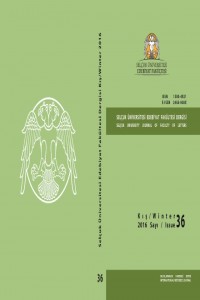Öz
Taşra
teması, modern edebiyatta kendine dönük bir çerçeve içinde daha çok savunma
mekanizması gibi algılanmıştır. İç göç sebebiyle taşra, şehre taşınırken geride
kalan ve değişmeyen bir yer olarak düşünülmüştür. Ancak taşra da değişime
uğramaya başlamış ve yeni bir algı içine oturmuştur. Türk öykücülüğünde taşra
temasının yeni yazarlarda nasıl bir perspektif taşıdığını tespit ve çözümleme
amacındaki bu yazıda, Mahir Ünsal Eriş’in Bangır
Bangır Ferdi Çalıyor Evde, İsmail Özen’in Günler Ne Kadar Kısaldı, Mustafa Çiftçi’nin Bozkırda Altmışaltı adlı kitapları değerlendirilmiştir. Yeni
öykücülerin taşrayı çocukluk ve ergenlik yıllarının saflığı içinde anlatması
ile bugünün perspektifinde onda eski yaşantılarını bulamaması bu öykülerin
esasını oluşturmaktadır. Taşranın yeni kalemlerde mekân ve ses imajları
etrafında erken nostaljiye dönüştüğü görülmektedir.
Anahtar Kelimeler
Kaynakça
- BİLBAŞAR, Kemal (1939). Anadolu’dan Hikâyeler. İstanbul: Türkiye Basımevi.
- ÇİFTÇİ, Mustafa (2014). Bozkırda Altmışaltı. İstanbul: İletişim Yay.
- ERİŞ, Mahir Ünsal (2015). Bangır Bangır Ferdi Çalıyor Evde. İstanbul: İletişim Yay.
- MERT, Necati (2010). “Öykücülüğümüzde Taşra”. Hece Öykü (40): 97-103.
- Orhan Kemal (2010).Yağmur Yüklü Bulutlar. Dünyada Harp Vardı. İstanbul: Everest Yay.
- ÖZEN, İsmail (2013). Günler Ne Kadar Kısaldı. İstanbul: Profil Yayıncılık.
- SÜALP, Z. Tül Akbal (2010). “Taşrada Saklı Zaman - Geri Dönülmeyen”. Taşra Kavramı Üzerine Tartışmalar Taşrada Var Bir Zaman. ed. Z. Tül Akbal Süalp-Aslı Güneş. İstanbul: Çitlembik Yay.
Öz
This paper
aims to explore and analyze in what perspectives new authors reflect "the
country" in Turkish Story. In this sense, Mahir Unsal Eris' Bangir Bangir Ferdi Caliyor Evde, Ismail
Ozen's Gunler Ne Kadar Kisaldi, and
Mustafa Ciftci's Bozkirda Altmisalti were
analyzed. Moreover, the transformation of the connection of the country and
globalization in to early nostalgia in new generations was examined in terms of
place and sound images. The theme “country” was mainly perceived as a defense
mechanism in an introvert frame in modern literature. Country was considered as
a place that is left behind and did not change while moving to city due to
internal migration. Yet, even country seems to chance and has a place in a new
perspective. The essence of stories consists that new story writers mention
country in the decency of adolescence years and that they cannot find their
past years in today’s perceptive.
Anahtar Kelimeler
The country story Mahir Unsal Eris Ismail Ozen Mustafa Ciftci
Kaynakça
- BİLBAŞAR, Kemal (1939). Anadolu’dan Hikâyeler. İstanbul: Türkiye Basımevi.
- ÇİFTÇİ, Mustafa (2014). Bozkırda Altmışaltı. İstanbul: İletişim Yay.
- ERİŞ, Mahir Ünsal (2015). Bangır Bangır Ferdi Çalıyor Evde. İstanbul: İletişim Yay.
- MERT, Necati (2010). “Öykücülüğümüzde Taşra”. Hece Öykü (40): 97-103.
- Orhan Kemal (2010).Yağmur Yüklü Bulutlar. Dünyada Harp Vardı. İstanbul: Everest Yay.
- ÖZEN, İsmail (2013). Günler Ne Kadar Kısaldı. İstanbul: Profil Yayıncılık.
- SÜALP, Z. Tül Akbal (2010). “Taşrada Saklı Zaman - Geri Dönülmeyen”. Taşra Kavramı Üzerine Tartışmalar Taşrada Var Bir Zaman. ed. Z. Tül Akbal Süalp-Aslı Güneş. İstanbul: Çitlembik Yay.
Ayrıntılar
| Bölüm | Makaleler |
|---|---|
| Yazarlar | |
| Yayımlanma Tarihi | 23 Aralık 2016 |
| Gönderilme Tarihi | 18 Ekim 2016 |
| Yayımlandığı Sayı | Yıl 2016 Sayı: 36 |
Cited By
Mustafa Çiftçi’nin Hikâyelerinin Tematik Olarak Değerlendirilmesi
Çanakkale Araştırmaları Türk Yıllığı
Tuncay BOLAT
https://doi.org/10.17518/canakkalearastirmalari.770606
Selcuk University Journal of Faculty of Letters will start accepting articles for 2025 issues on Dergipark as of September 15, 2024.


